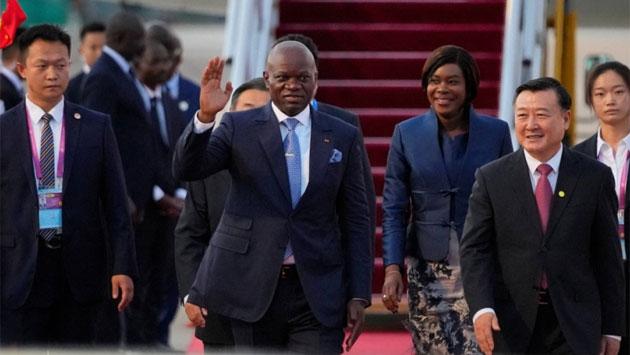Reply To:
Name - Reply Comment
 The Japan Times - The U.S. is assembling an economic and security assistance package for Gabon in a bid to prevent China from establishing a military footprint in the strategically positioned Central African nation, according to people familiar with the matter.
The Japan Times - The U.S. is assembling an economic and security assistance package for Gabon in a bid to prevent China from establishing a military footprint in the strategically positioned Central African nation, according to people familiar with the matter.
The agreement will include training for Gabon’s special forces and $5 million in funding for the country’s democratic transition, according to the people, who asked not to be identified discussing private information. The U.S. has in recent years tried to chip away at China’s role as the dominant foreign power in Africa, but has yet to match Beijing’s financial largess — including another $50 billion pledged this week — and is widely regarded as not having treated the continent as a strategic priority.
On Thursday, at the ninth triennial Forum on China-Africa Cooperation in Beijing, Chinese leader Xi Jinping also pledged to deepen China’s military commitment, announcing 1 billion yuan ($141 million) in military assistance to train 6,000 military personnel and another 1,000 law-enforcement officers in Africa.
The U.S. move comes after what American officials say were Chinese attempts to establish a military training facility in the Atlantic coast nation, which U.S. officials believe could serve as a precursor to a permanent base. The U.S. maintains a sprawling network of military installations around the world — including in China’s backyard — but views any Chinese base on the Atlantic as a red line.
The package, which isn’t finalized, will be unveiled during a visit to the U.S. by Gabonese interim President Brice Clotaire Oligui Nguema in late September or early October, the people said. It will also include radar to help the country monitor illegal fishing, an expansion of its partnership with the West Virginia National Guard, and assistance with conservation in its national parks.
A White House National Security Council spokesperson said U.S. foreign policy is never a response to any one country, adding that the U.S. works with Gabon on issues ranging from democracy to security and economics. A Gabonese government spokesperson and a Foreign Ministry official declined to comment when reached by phone. The Chinese foreign and defense ministries didn’t respond to requests for comment, but China has previously said its military presence in Africa is aimed at supporting peace on the continent.
During meetings with Nguema in Gabon in July, Deputy Secretary of State Kurt Campbell warned that any Chinese military training facility would likely be a precursor to a more enduring presence — as happened in Djibouti, according to the people.
"What happened in Djibouti is the Chinese came and said we just want a logistics facility here,” David Cohen, deputy director of the CIA, said in an interview. "It has transmogrified into quite a large naval facility where you have a permanent Chinese naval presence and an exclusion of the Djiboutians from their own territory.”
China opened its base in the Horn of Africa nation in 2017, establishing a military foothold off the Bab el-Mandeb strait, a crucial maritime chokepoint that’s key to global trade flows. The U.S., France, Japan and other countries also have bases in Djibouti. A Djiboutian official declined to comment.
The same pattern occurred in Cambodia, where China has established a naval presence, Campbell told Nguema, according to the people. Nguema assured Campbell that Gabon would not make the same mistake, they said.
Cambodia has repeatedly denied the allegation, saying any permanent foreign presence would violate its constitution. China says its cooperation with Cambodia is "transparent.”
China’s push for bases in Africa and beyond is likely to continue as Beijing seeks to build a world-class military capable of projecting power globally and protecting its citizens overseas. The U.S. views these efforts as a threat to its ability to maintain a military edge over China and part of a broader strategic rivalry between the world’s two largest economies.
A 2023 Pentagon report listed 18 countries that China has probably also considered as locations for "military logistics facilities,” ranging from Myanmar to Pakistan, the United Arab Emirates and Tajikistan.
U.S. officials believe Beijing also previously pushed for military access in Angola and Equatorial Guinea, which are also on the Atlantic, the people familiar said, but that those talks have stalled.
China is currently attempting to secure military port access in Tanzania and Mozambique — on Africa’s eastern coast — according to the people. It has also sought to secure status-of-forces agreements with both nations that would provide a legal basis for stationing Chinese troops, the people said.
While a Chinese military presence on Africa’s eastern seaboard would likely be less worrying for the U.S. than Atlantic access, it would enhance China’s ability to project power into the Indian Ocean, as well as in the Middle East. The waters around southern and eastern Africa have also become more strategically significant as Houthi militant attacks on shipping in the Red Sea force many commercial vessels to sail around the southern tip of Africa.
China conducted trilateral military drills with the two countries last month.
Tanzanian Defense Minister Stergomena Tax and Mozambican Transportation and Communications Minister Mateus Magala both said via text message that they’re unaware of any plans to build bases or station Chinese troops in their respective countries.